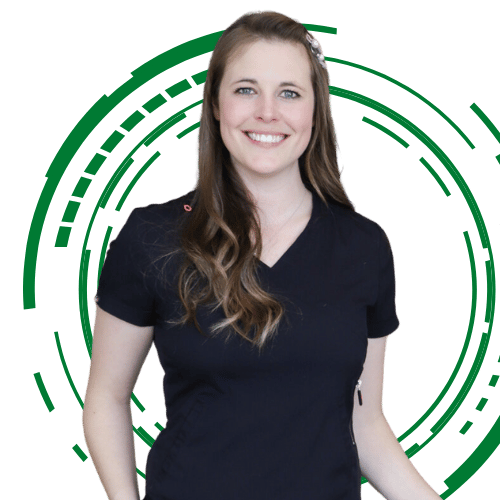Diode Laser Applications Certification for Dental Hygienists
Continuing education in Edmonton, Alberta
CE credits will vary* | $895 | In-person & online | Limited capacity
* This number is an estimate. Your regulatory body will issue the credits.
We designed this course for dental hygienists to provide training in support of diode laser physics, safety, and clinical utilization for diode laser systems.

Jump to:
What you'll learn | Pricing and details | Faculty
What you will learn
Our course provides participants with a strong foundational understanding of:
- Laser physics
- Laser tissue interaction
- Laser wavelength characteristics
- Clinical case studies
- Laser safety
- Regulatory information
We focus on diode lasers for dental hygienists and provide the opportunity for hands-on training. Register today to develop the skills necessary to fully utilize this instrument in the clinic.
The impact of lasers
This technology can have a wide range of impacts in clinics:
- Gingival decontamination of periodontal pockets. Laser therapy effectively removes bacteria and infected tissue, assisting in the management of periodontal disease.
- Soft tissue management procedures like gingivectomies and operculectomy with precision. These procedures contribute to improved gum health and can be less uncomfortable for patients.
- Enhance scaling and root planning procedures with lasers to enhance their effectiveness. Laser-assisted scaling and root planing procedures can aid in the removal of calculus and improve the overall outcome of periodontal therapy.
- Desensitizing teeth with exposed dentin. Dental hygienists can use laser therapy to reduce tooth sensitivity, improving patient comfort during and after dental cleanings.
- Pain management and relief for conditions like TMJ disorders or to treat painful oral lesions, offering patients quicker relief and healing.
- Improve patient comfort as diode lasers often result in less pain and discomfort during dental hygiene procedures. Patients may appreciate reduced sensitivity during cleanings and quicker recovery times.
- Improved efficiency with diode lasers, reducing the time needed for certain procedures and improving overall patient flow.
- Reduced bleeding during dental cleanings and soft tissue procedures, making the experience more comfortable for patients.
- Safety and infection control as diode lasers can reduce the risk of infection transmission by decontaminating treatment areas and instruments.
Dental hygienists should receive proper training and certification to use diode lasers safely and effectively in their practice. These lasers can enhance care quality, improving oral health outcomes and patient satisfaction.
Pricing and details
Syllabus
Online materials
Embark on a flexible learning journey with our online modular course. The series of modules cover a wide range of topics, including:
- Module 0: Laser safety
- Module 1: Laser history
- Module 2: Laser physics
- Module 3: Laser components
- Module 4: Lasers available in dentistry
- Module 5: Periodontal therapy
- Module 6: Guided tissue regeneration
- Module 7: Laser applications in dental hygiene
- Module 8: Implementing lasers in dental hygiene
- Module 9: Communication skills for the dental hygienist
- Module 10: Insurance codes
In-Person session highlights
Complement your online learning with an enriching in-person session. Join us for hands-on experiences and interactive workshops that bring theory to practice:
- Live demonstrations: Witness live demonstrations of dental laser procedures, enhancing your understanding of their application.
- Hands-on workshops: Engage in guided hands-on workshops, allowing you to practice laser techniques under expert guidance.
- Q&A with experts: Interact with experienced dental professionals, clarifying doubts and gaining insights from their expertise.
- Networking opportunities: Connect with fellow dental hygienists, fostering valuable professional connections.
Upon completing the online course and attending the in-person session, you'll be equipped with the knowledge, skills, and practical experience to confidently integrate dental lasers into your practice, elevating patient care and outcomes.
Prerequisites
Participants must:
- Hold an RDH designation and an active practicing license from their dental hygiene regulatory authority.
- Provide a letter of good standing from their current dental regulatory authority, if they are out-of-province (please check with the regulatory body if diode laser certification is allowed to be taken).
- Current Heart & Stroke Foundation CPR certificate.
- ONLY Heart and Stroke Foundation CPR is accepted, due to corresponding ACLS training and certification through the foundation.
Cancellation transfer policy
- Refunds will not be facilitated except in extreme circumstances. Transfer to a future session may be facilitated under certain extenuating circumstances and with sufficient notice provided.
- A cancellation fee of 20% of the entire program fee will apply for cancellations.
- Please note tuition may be subject to an increase for future course offerings.
Class materials and schedule
Course modules can be found in eClass. Access will be provided two weeks before the posted clinical training date and will remain open for an additional two weeks after the clinical. The online module must be completed before the clinical training day.
- Evening before clinical training
- 6:30 p.m. - Pre-hands-on review via a live Zoom webinar
- Clinical training day
- 8 - 10 a.m. - Clinical preparation
- 10 a.m. - 12 p.m. - Demo and partner practice
- 1 - 4 p.m. - Patient application and evaluation
Online materials are accessible for one year.
View Available Dates and Pricing
Questions?
Contact us at dentce@ualberta.ca
Our leading faculty
Jacquelyn Charleson
Dental hygienist
Charleson, RDH, BSc, graduated from the University of Alberta with a diploma in dental hygiene in 2016. She further advanced her education by earning a bachelor of science degree in 2017.
In 2019, Charleson established her own independent dental hygiene practice. Since 2021, she has incorporated the use of lasers into her routine care practice. Charleson is enthusiastic about contributing to the university's continuing dental education program.

Questions?
Contact us at dentce@ualberta.ca
Future dates
Are you looking for different course dates? The new course schedules will be available in August.
Keeping you in the know
Stay up-to-date on the latest continuing dental education offers, events and courses.